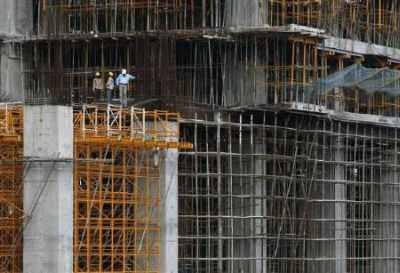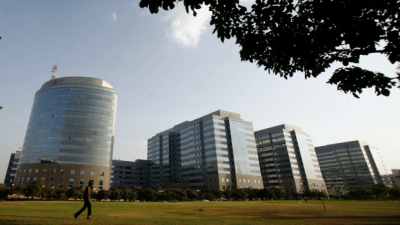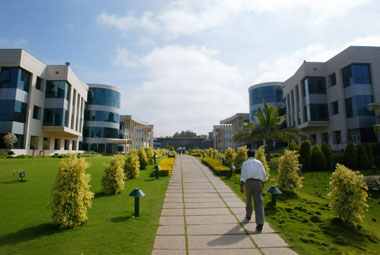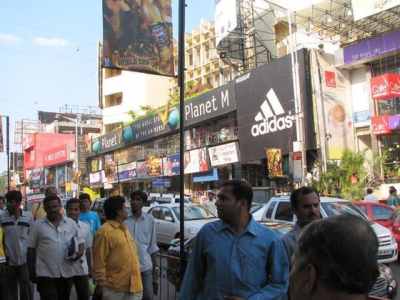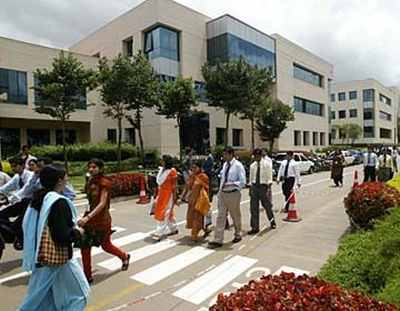 | « Back to article | Print this article |
Bangalore absorbs 3rd of India's commercial space
Powered by strong demand from IT and related sectors, Bangalore is seeing a record absorption in commercial and residential segments amid a sharp fall in demand seen in key property markets such as Mumbai and the national capital region (NCR).
The Karnataka capital, classically called the City of Gardens and of late touted as an IT hub, has consumed a third of country's total absorption of commercial space at 11.7 million sq ft in 2011. This is 15 per cent higher than the space absorbed by the city in 2010, says a report released by Kotak Institutional Equities on Tuesday.
In comparison, NCR and Mumbai have absorbed commercial space of 6.2 million sq ft and 4.1 million sq ft respectively in 2011. NCR has seen an increase of 8 per cent over 2010 and Mumbai has seen a decline of 6 per cent.
For Rediff Realtime News, click here
Click NEXT to read more...Bangalore absorbs 3rd of India's commercial space
The record office absorption has also fuelled similar levels of demand in residential properties. Bangalore has seen an absorption of 49 million sq ft of residential properties in 2011, which was more than any Indian city, according to Kotak Institutional Equities.
While Bangalore had a share of 20.4 per cent in 238 million sq ft of residential units sold in top seven cities in 2011, Mumbai had a share of 14.8 per cent and Gurgaon 19.7 per cent in 2011.
Although Bangalore has seen a drop of 18 per cent in absorption of residential units in 2011 vis-a-vis 2010, the city is well placed in comparison with the NCR and Mumbai Metropolitan Region (MMR) which have seen 52 per cent and 57 per cent fall in absorption of residential units respectively in in 2011, according to data culled by realty research firm PropEquity.
Click NEXT to read more...
Bangalore absorbs 3rd of India's commercial space
"IT companies have seen a windfall due to rising rupee," says K Madhusudan, co-chief investment officer, Azure Capital, Bangalore based realty fund manager. "Both global IT majors such as IBM, Oracle and Cisco and domestic companies are hiring aggressively. That is driving the growth of residential and office markets in the city."
Ashutosh Limaye, head of research and real estate intelligence service at Jones Lang LaSalle, points out that apart from within the state, the pan India demand for Bangalore properties is high.
As per property consultant JLL, the vacancy in commercial properties stood at 11 per cent in in four quarter of 2011. It is further set to fall to 8 per cent in 2013. Rentals are set to increased 5 per cent and 7 per cent in 2012 and 2013 respectively.
Click NEXT to read more...
Bangalore absorbs 3rd of India's commercial space
As per software industry body Nasscom, IT headcount is set to grow by 10 per cent per cent in FY2013, which augurs well for commercial demand by IT/ITES, especially in Bangalore.
According to experts, affordable prices and availability of land have also fuelled the demand for properties.
In the recent National Housing Bank Residex, the index indicating property prices across key cities in India, Bangalore saw a mere fall of 1 per cent in residential properties in October to December 2011, compared to the corresponding period in 2010.
Click NEXT to read more...
Bangalore absorbs 3rd of India's commercial space
Mumbai saw a 11.6 per cent jump in home prices, while Delhi saw a 35.8 per cent increase during the October to December 2011.
"Despite good demand, prices have not gone up sharply," says Madhusudan. "You can get good residential property at Rs 30 lakh to Rs 35 lakh in Bangalore."
Adds S Bhaskaran, chief financial officer at Bangalore-based Sobha Developers: "There is a good absorption and developers are proactively keeping prices affordable. There is a product available at different price points. You can buy a house at any price between Rs 20 lakh and Rs 1 crore or more."
Click NEXT to read more...
Bangalore absorbs 3rd of India's commercial space
According to Limaye, there is no pressure on land, unlike in Mumbai, which is surrounded by sea at both the sides. "Different corridors are leading out of the city and new areas have come up outside the city," he adds.
The favourable property markets also resulted in Bangalore remaining at the tenth place in the top investment destinations 2012 list brought out by Urban Land Institute and PricewaterhouseCoopers. Mumbai and New Delhi fell from the third and fifth place in 2011 to 15th and 12th in 2012.
"Bangalore's organic growth-driven market and ability to buck mega trends," said a report by ULI and PwC, "has helped it retain its credentials as a stable play and maintain its position on the list."
